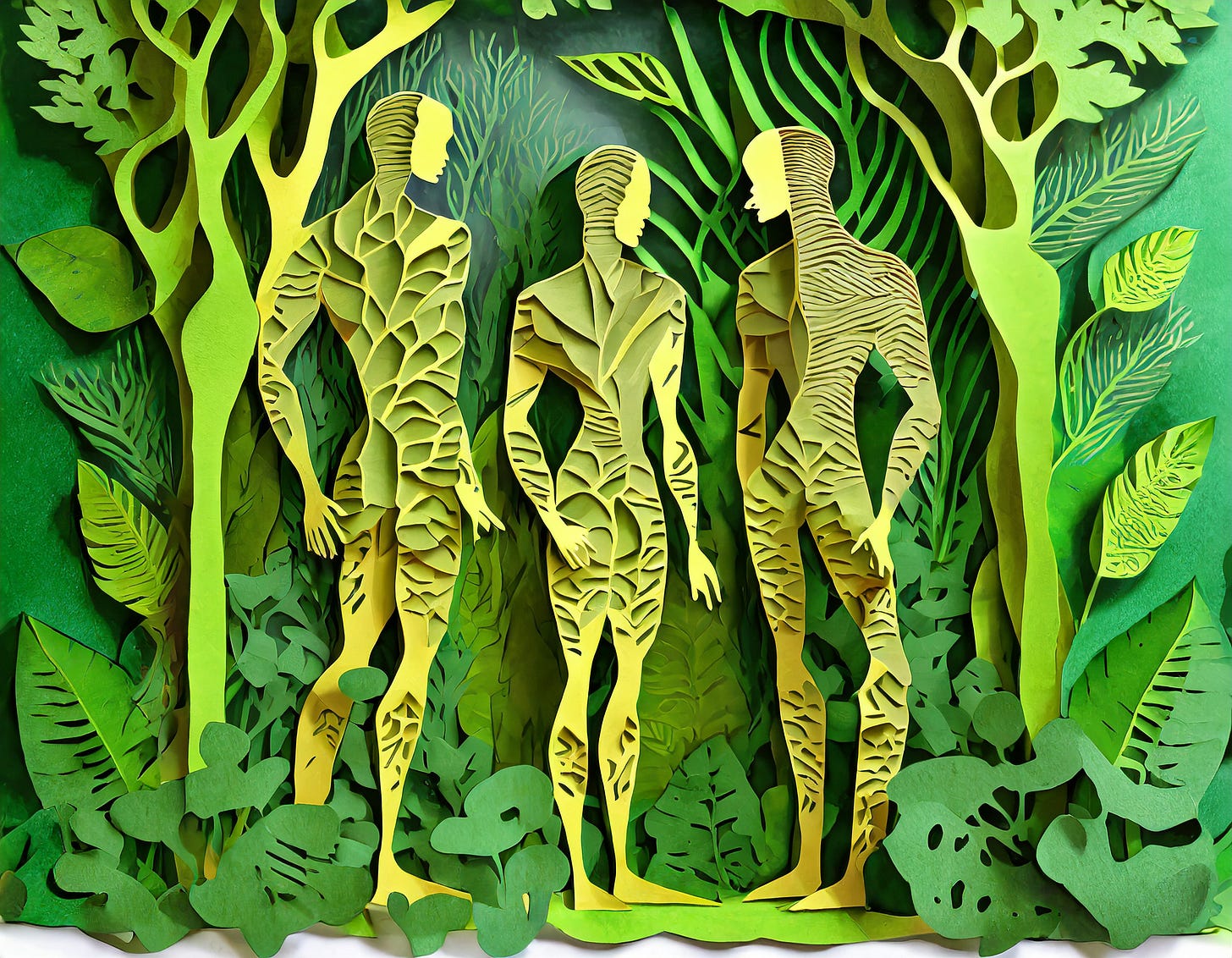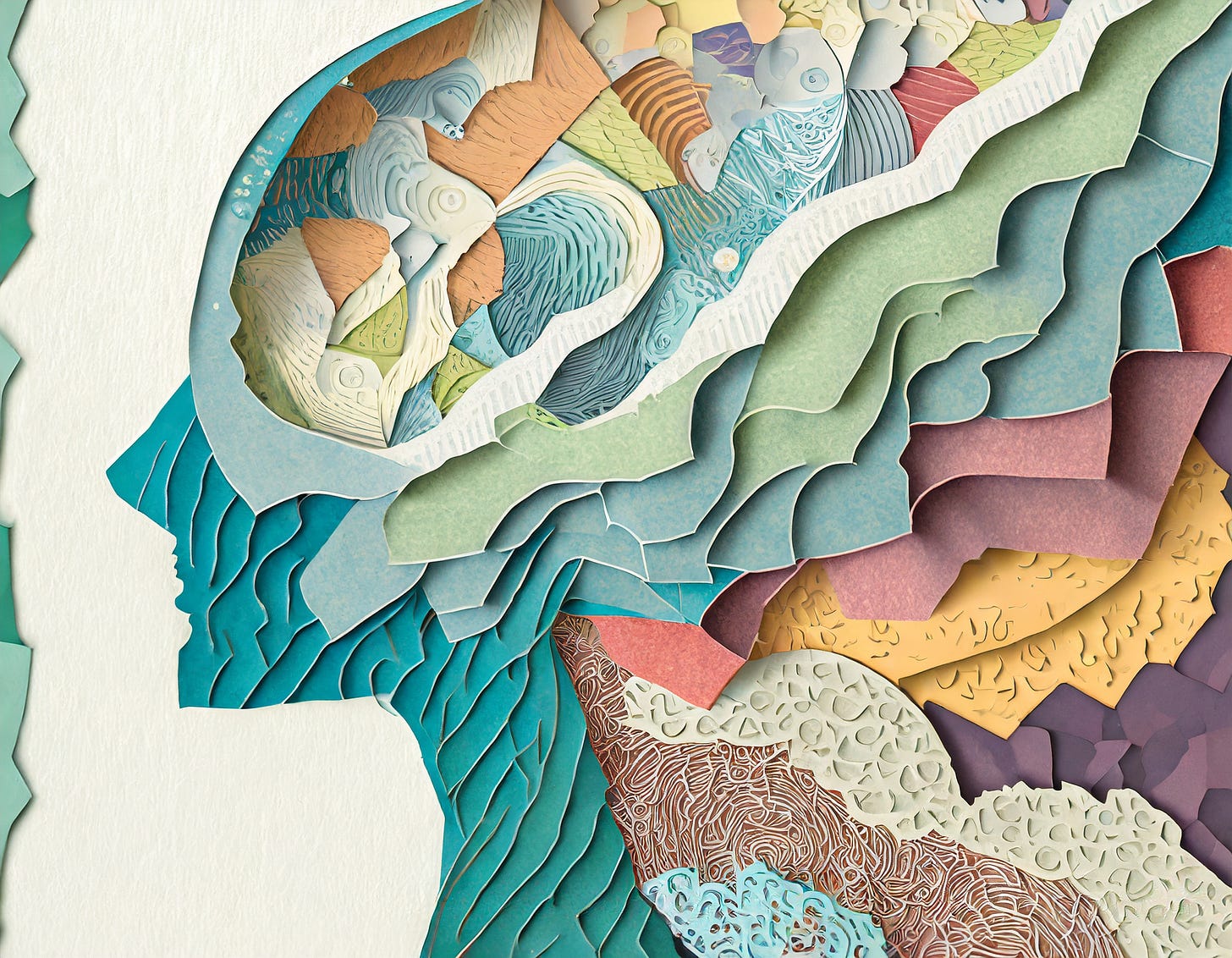[>Part I here<] [>Part II here<]
Binary, hierarchical and absolutist thinking
One of the huge modern challenges is working according to binary, hierarchical and absolutist thinking. Binary thinking makes us ignore the delicate, subtle, wild, and paradoxical energy, which is as correct as wrong. Absolutism demands one (not two, just one) absolute final answer, and has great difficulty working with impermanence, ambiguity, or paradoxes. Then there's the insidious hierarchical thinking present in many models and methods, such as the idea of the ladder of consciousness, in which as we mature, we climb and evolve.
This linear logic naturally leads to the conclusion that there are more and less evolved consciousnesses, meaning that if I'm at a specific stage of individuation, I'm more evolved than the other person and can look down on them, whether they're a plant, animal or person.
This is very dangerous in a systemic pluriverse made up of spontaneous, eternal and porous cyclical transitions. With this limited lens, we lose a lot of information, relations, wisdom, and possibilities for dialogue. One of the profound teachings of places is that everything is fine until it isn't. When we limit ourselves to an idea of fixed identity, we exile the innate power of transformation and metamorphosis. These transgressions of consciousness are like breathing, expanding and contracting, in organic, living and deeply relational processes.
The three souls
Absolutist and hierarchical binaries prevent or discourage us from relating integrally to things. It is the wisdom of the heart that helps us to accept different perspectives, in all their diversity and impermanence. The heart is where the soul dwells. The soul is so delicate, gentle, and powerful because it speaks of our uniqueness.
There are indigenous perspectives, from contextual cultures with cosmologies and metaphysics that are different from western eurocentric modern psyches, that speak of the soul not as a "thing", but as a verb and dialogue, which is interesting because it gives us other clues.
These are cultures that have lived in the same landscape for thousands of years, literally walking on the bones of their ancestors. From a relational perspective, it's empowering for all the stories to inhabit the place of radical belonging, because one of the souls in dialogue and relationship that inhabits us belongs to the place where we were born and grew up.
The landscape that nourishes the oldest memories of these familiar places. From this perspective, we have the soul of identity — not the same concept of individual identity that the isolated and dangerous Western sense teaches us. But a contextual identity, always in relation, is never isolated. A dynamic and responsive identity that brings talents and potential, service and mission, and diverse life purposes. Because life purposes are varied and dynamic, much richer and truer than just one purpose. We all know this because we've been through shifts, which is part of the whole process of rediscovery.
We have a soul that belongs to the stars, which is unrepeatable and returns to the centre of the universe every time our organic body dies. These three souls together make us up — the soul of the place, the soul of the heart and the soul of the stars.
A huge difference between the intuitive wisdom of the heart and the knowledge of the mind is that they are not dual but fractal. Our heart comprehends, vibrates, feels, and always perceives the wholeness. Therefore, it is imperative to reconnect with the heart, womb, and intestine, as otherwise, we may become isolated, exiled, and mutilated from our profound interconnectedness.
Hymma
It's a Sufi term that literally means the creative power of the heart, linked to imagination. Imagining, being present in the body and opening up creative space for intuition and spontaneity is what happens when we feel and not try to understand something, draw objective or rational conclusions.
We can do this on a walk in the woods; normaly we run the risk of looking at things from a point of view of exclusively ordering, naming and cataloguing, perpetuating the separation from the connection to the heart.
However, both visions, mind and heart, are not mutually exclusive, as they coexist in each of us. Spontaneity is fundamental because it's what emerges at every moment and where we can't reach it rationally. It's delicate wisdom that is easily muted, invisible or silenced. Extremely subtle, the common sacred ability to penetrate deeply into life, to feel beyond the visible, touching the core of things.
The three-dimensional mind
I want to weave the idea of the three-dimensionality of the mind, congruent with the three-dimensionality of the three essential centres of perception about the world and reality: the gut/uterus, the heart and the brain.
So, the mind has three layers: the conscious, the subconscious, and the unconscious. We've already talked a little about the unconscious, our wildest landscape where anything can happen, a profound universe, but it's also where the transformations and realisations take place.
The unconscious is extremely radical and because it speaks of the root, it is linked to the intestine/instinct.
Nowadays, we confuse understanding and perceiving with judging or cataloguing, making it difficult to discern. When we judge, we objectify something or someone. To objectify is to take out of context, exiling stories, layers, and hybrid porosity. Objectification and judgment can block other wisdom in their linear quantification process, factual logic, organization, and cataloguing, be it ideas, concepts, or experiences.
We are addicted to meaning so that we can organise everything on shelves. For example, in our process we can find information that tells us that the ego is bad, very bad! Because the ego, as it is constructed, lived and valued in modern (hyper-individualistic and super-consumerist) culture, is considered a tool for exponential isolation and separation. But the ego isn't all bad; it's our way of functioning in the world and has a practical side. The issue arises when we confuse identity with ego. But fortunately, we are all much more than the ego thinks we are.
We always need (are) the network, we claim the integration of the visceral reality of constant interrelationship. I'm referring to the animist perspective, for we're not the only ones who bring dreams and meanings to the world. From this animist perspective, everything is alive, and everything contributes to everything, dynamically and porously, in a complex interconnection of living systems.
This idea of isolation is linked to success in productivity in being, doing, going, realising, fulfilling, and it's often exasperating how much we think we have to do on our own. In fact, as nothing exists in isolation, there's a secret of nature that says we don't have to do anything alone, for but nothing is done alone.
We experience integration and relationship in nature, in places of deep reciprocity. It's an invitation to our rational mind not to silence the depths of the soul. And we must have the dignity and courage to follow, do, or be with this rational mind even (and especially when) it gets in the way of what the mind believes is right or should be done.
Occasionally, it's even necessary to choose the wrong side of the crossroads, to transgress and go in the opposite direction, because otherwise, we won't find the line, the purpose, or the melody of the soul. For some people, this is easy to do, while for others it's much more difficult. But it's not a competition, and there are no prizes at the end. It has no end in itself; the ultimate goal is always life, and reverence is life itself. The process of reorienting the mind is an experiential and life process, it's something that, due to the culture and context in which we find ourselves, we have to constantly remember. We are more than this, we are much more valuable, profound and valid.
Another thing that an isolated mind perpetuates in its language is its lack of intrinsic value. On the linear path of objectivity we lose many threads of context, network, identity and stories, stripping away the intrinsic value and sovereignty of anything and everything. Why are we valid today? Only if we prove we're valid; otherwise we're automatically invisible. We are valid if we do something remarkable, if we produce and materialise all the time. Otherwise, we have no value! It's tragic because in this way we don't respect the delicacy of wisdom at all, the power of the real intrinsic value that we are just by being here, in relationship, in presence, just by listening, feeling or imagining.
So my invitation is to relativise our minds to listen again to our hearts, our wombs, our intestines, to listen once more to the spaces that surround us, the places and landscapes.
Talking to places
So how do you talk to a place? How do you do it? What language do places speak and what do they say?
To talk or open up this sacred space of reciprocal dialogue with entities much greater than ourselves —those who breathe life into us and embrace us at every moment— means we are not leaidng the conversation. It's not an extractive dialogue, from which we extract right or wrong answers for personal use. It's a conversation in reverence.
There are no objective answers, but stories, sensations and a non-hierarchical, visceral commitment to the relationship.
We know this language and its grammar deeply, even though they are non-verbal. It's the language of the soul, dreams, metaphors, and symbols. We can't weigh, measure, or know the chemical composition of a metaphor, but that doesn't make them any less real, especially in the doors they open for us. We need to cultivate this relationship with time and patience.
Sound cartographies
I invite you to make a record, a sound mapping of the place where you are. With a mobile phone, we can record some surrounding sounds. Where are you now? It may not be your favourite place or the one that speaks to you the most; it may not be a place that opens you up or nourishes you deeply, but it is where you are. So dignify it by listening to it. Don't just listen with your head, it might even help to close your eyes so that the process isn't just controlled by what we see. Again, quieten our minds and speak directly from the heart: there is no right or wrong. There are no mistakes here, no tests. Just allow the experience and sensation to unfold. Highlighting the richness that is present all around us, wherever we are.
Giving voice and space to tell a story of some place that has taken you away, nourished, accompanied, cosied up to you or challenged you. A place that you carry within you in your memories and identity.
I suggest simply receiving the earthy energy of the place —sacred energy that emanates from the earth of each place in particular and all of us together. It's so valuable to recognise this energy that pulls because it's a deep sense of community. It's not linear or just good or just happy because things are much richer than just happiness, aren't they?
[>Part I here<] [>Part II here<]
This article was written in Portuguese on August 1st, 2022; the original publication is here.








So much in a few pages….! I am grateful to you foe ending with the invitation to listen to Place, and to welcome the energy rising from it. So often we forget to do it